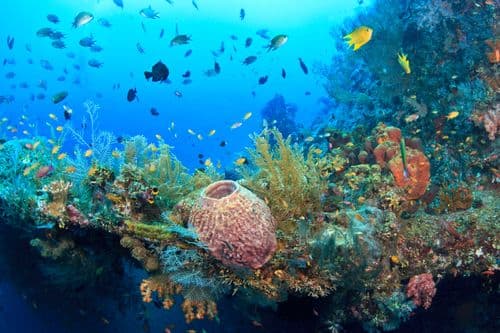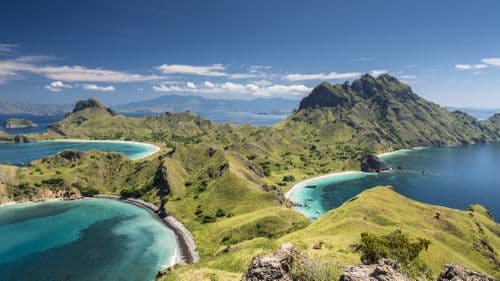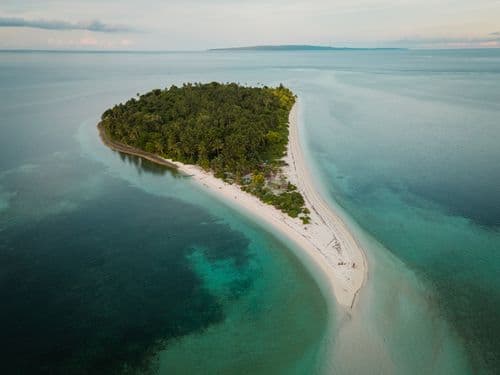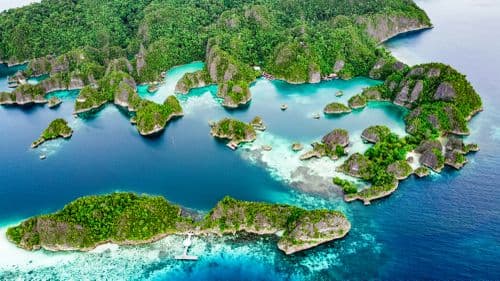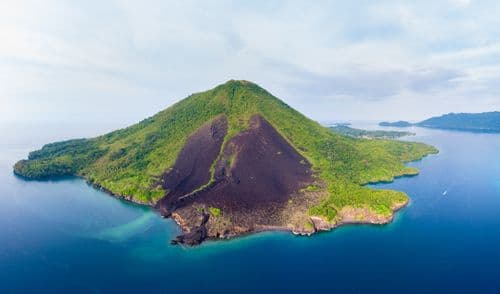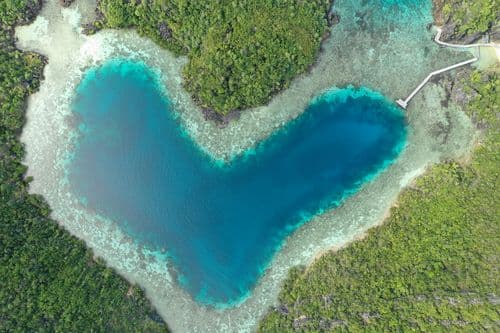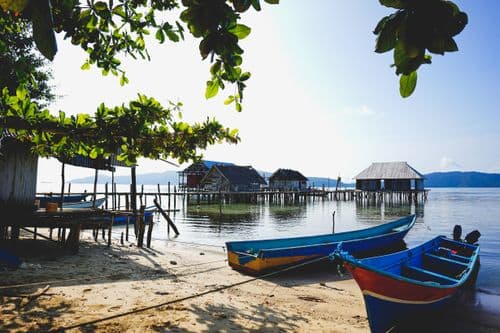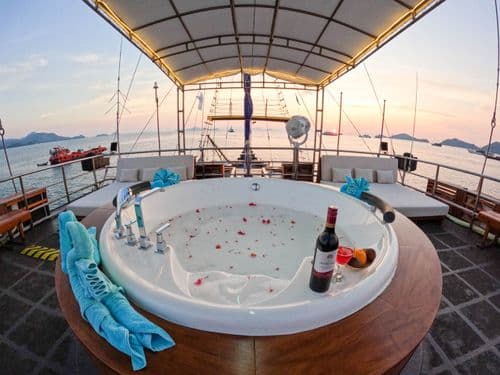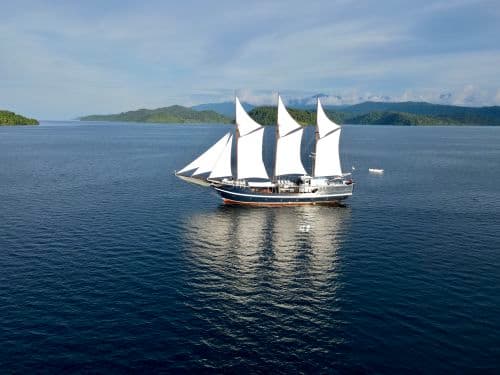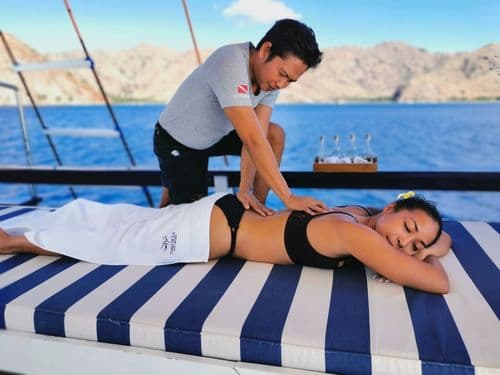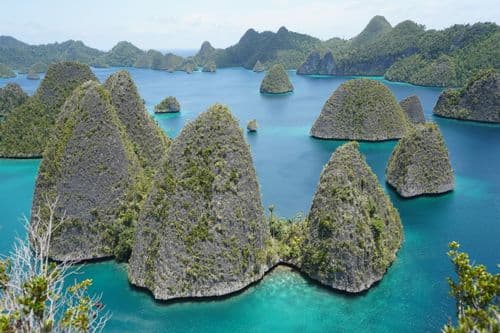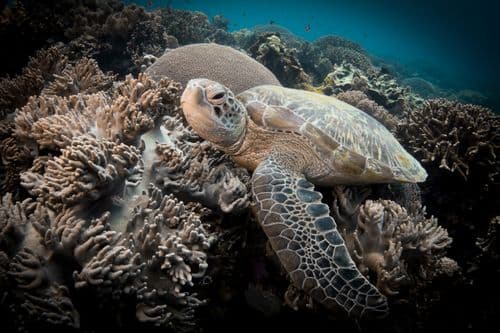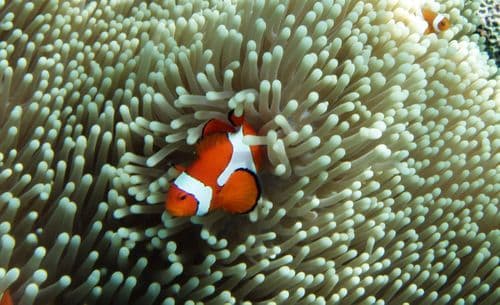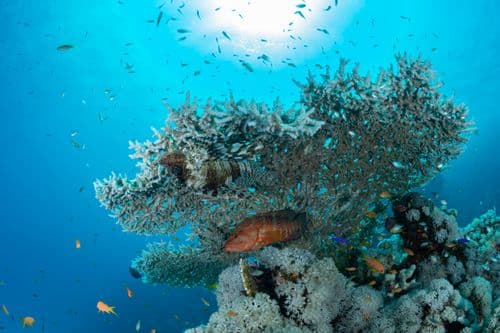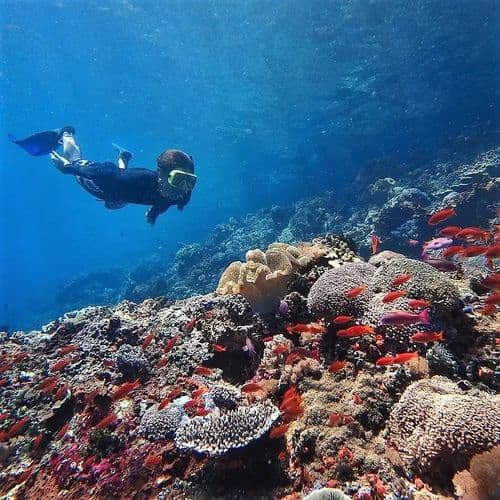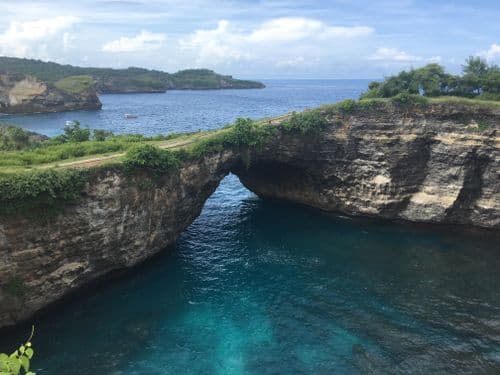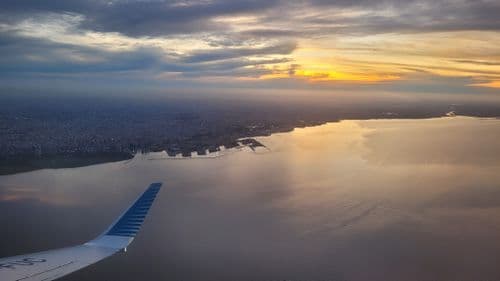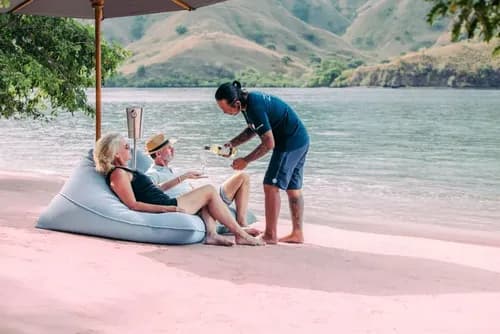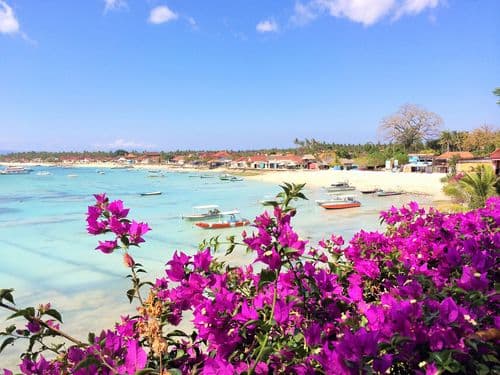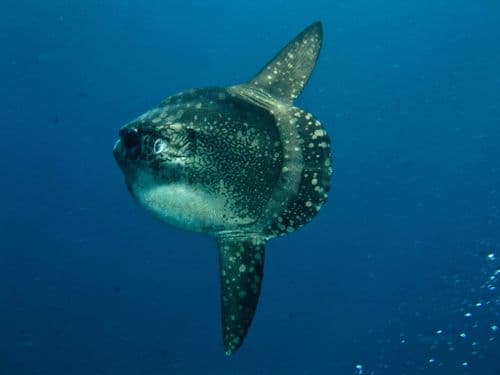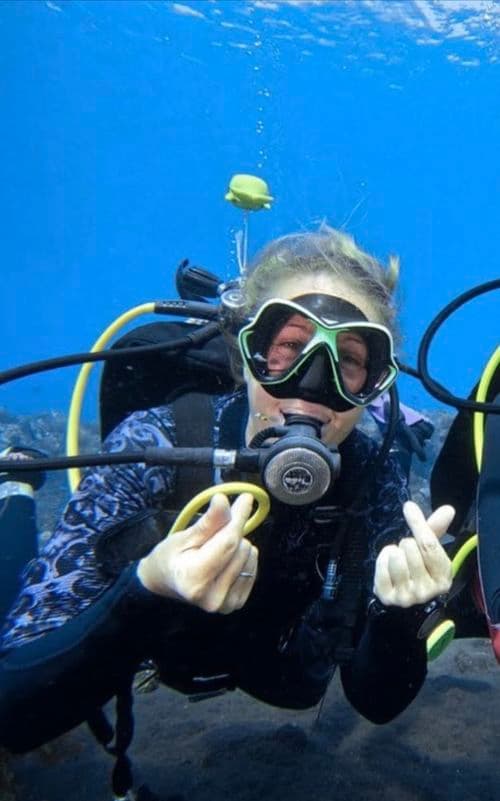
Maluku Islands and Raja Ampat Expedition
An 11-day adventure on board the Scuba Spa Zen
Length
10 Days
Ship category
Luxury
Ship type
Phinisi Yacht
Capacity
20 Passengers
Maluku Islands and Raja Ampat
8 Reviews
Trip highlights
Dive at the best macro dive site in Ambon
Swim with thousands of fish
See the majestic black manta
Snorkel with thousands of jellyfish
The DiveIndonesia experience
Dedicated dive boat with 24 stations and NITROX facilities
Exclusive wellness offerings, including morning yoga and five-star spa services
Gourmet dining experiences with a mix of Indonesian and international cuisine
Personalized service with a high crew-to-guest ratio, ensuring attentive care
Join us for an 11-day diving and wellness journey through the Maluku Islands and Raja Ampat on the luxurious Scuba Spa Zen. This expedition perfectly blends adventure with relaxation, featuring world-class diving and premium spa treatments. The journey starts in Ambon and ends in Sorong, offering up to 26 dives across stunning reefs and marine biodiversity hotspots. Divers will explore the remarkable reefs of Raja Ampat, the dramatic underwater volcanoes of the Banda Sea, and historical shipwrecks in the Maluku Islands.
Non-divers can indulge in a variety of activities, ensuring a holistic and enriching experience. Enjoy daily yoga sessions on the sundeck, unwind with luxurious spa treatments, and participate in kayaking and paddleboarding. Explore the stunning landscapes during beach excursions and cultural visits to local villages. The Scuba Spa Zen ensures a perfect balance of adventure and relaxation for both divers and non-divers alike, making this trip an unforgettable experience for all.
Your ship: ScubaSpa Zen



What we really love about the Scubaspa Zen is how it perfectly combines luxury and adventure in one stunning phinisi yacht. This 53-meter vessel, crafted with elegance and designed for ultimate comfort, offers a unique liveaboard experience that caters to both divers and non-divers alike.
Imagine waking up to the gentle sway of the ocean, knowing your day will be filled with thrilling dives and indulgent spa treatments. Onboard the Scubaspa Zen, every detail is designed to create an unforgettable experience. With itineraries exploring the vibrant reefs of Raja Ampat, the thrilling waters of K … Read more about ScubaSpa Zen
Cabins




Amenities
Transfers to and from ship
Bar
Nitrox (free)
Private Bathroom
Wetsuits (can be rented)
Zodiac Fleet
Snorkel gear (free of charge)
Eco friendly
Yoga
Room Safe
Kayaks on board
All meals
Laundry service
Spa
Air conditioning & private bathroom
Standup paddle boards
Medical Services
Library
Internet/Wifi
Sundeck with jacuzzi
Restaurant
Food & Drinks
Dining aboard the Scubaspa Zen is a culinary delight. The chefs craft gourmet meals using fresh, local ingredients, with buffet-style meals and à la carte dinners that cater to all dietary preferences. The ZEN bar offers a wide range of spirits, cocktails, beers, and an extensive wine list, perfect for accompanying meals or enjoying evening drinks.
Map
Itinerary
Your itinerary below may vary, depending on the weather, wildlife breeding, and local conditions.
Day 1
Ambon



Pick-up point: Pattimura International Airport
Embarkation time: 2:00 pm
After being greeted at the airport or hotel by Scubaspa ZEN crew, travel to the harbor and embark Scubaspa ZEN. Enjoy a short rest before unpacking while the spa opens to offer information and treatment reservations.
Crew introductions and boat briefings will be held by the Cruise Managers, followed by a welcome dinner at our al fresco restaurant.
Day 2
Ambon - Nusa Laut



Your first dive will be at Laha. Located about three kilometers inside the bay on the northern coast, it is the best macro dive site in Ambon. The colorful fish here put on quite a show and for most scuba divers, witnessing this scene is worth the entrance money alone. There is no shortage of life among the small corals and rubble found along the sea bottom. The area is famous for frogfish, juvenile fish, ghost pipefish, and rhinopias. Each dive in Laha will add something new and interesting to your scuba diving holiday.
The vessel will cruise towards Nusa Laut for watersport and snorkeling activities, voyage to Run Island before dinner, and cross the Banda Sea overnight.
Day 3
Run - Ai



Awake next to the Island of Run and start your day with yoga on the beach to boost your energy level. Enjoy breakfast at the restaurant and perhaps a treatment at our spa. There will be two options to enjoy Run Island, either a visit to the beach with water sports activities and snorkeling or diving at Run. Run offers outstanding reefs and large schools of fish. Sloping reefs meet with a wall up to 30 meters deep covered in a range of beautiful corals with huge sea fans, a variety of colorful coral fish, and several overhangs to explore. After water activities, lunch will be served at the restaurant.
A short journey away from Run lies the Island of Ai. This area acts as an oasis for pelagics that cruise by pristine hard coral reefs teeming with fish. Continue the day with sunset salutation yoga to unwind from the day’s activities. Enjoy dinner at the restaurant before a short cruise east towards Banda Neira.
Day 4
Banda Islands - Banda Neira



Start your day with morning yoga or walking around this picturesque village and explore as you admire the perfect natural harbor beneath the shadow of the active Banda Api Volcano. Your first dive after breakfast will be at Batu Kapal, a small rock off Banda Neira Island with beautiful coral, sponge, and sea fan formations on the pinnacle walls. White tip and grey reef sharks can be seen in the deeper areas. The next dive site is Pohon Miring, one of the top dive sites in Banda and known for swim throughs full of gorgonian sea fans and huge sponges, a rocky plateau full of small critters, and amazing visibility.
In the evening, enjoy a barbecue at the restaurant prepared by our chef while the vessel sails to northeast towards Koon Island.
Day 5
Koon



Awake next to the sprawling sandbanks of Koon Island that stretch almost as far as the eye can see at low tide. This Maldivian-like landscape is truly spectacular, as is the range and diversity of the fish and coral life underwater. In the gateway between the Banda and Arafura Sea, the strong currents encourage diverse and plentiful fish and coral life. The day’s diving will be highlighted by the unforgettable experience of swimming around with millions of fish, schooling jacks, barracuda, sharks, and much more. A special lunch barbecue at the restaurant between dives will complete your journey to this tiny Island. After the third dive, the vessel will cross the Arafura Sea and sail overnight north towards Wayil Batan Island.
Day 6
Misool



Fiabacet Islands, located eight nautical miles east of Wayil Batan, is a fantastic area of three small rocks. The reefs here are remarkably healthy and often said to be some of the most beautiful reefs in Raja Ampat. The macro life is flourishing amongst the healthy corals, where you can find many different types of pygmy seahorses and nudibranchs. You can also see the majestic black manta in this area. In the evening, enjoy a night dive at Romeo where you can see walking sharks.
Day 7
Misool



The Wayil Batan area is a 30 km wide channel with medium to strong currents. One of the best sites for macro divers is Gorgonian Passage. You will be able to spend a good part of your dive exploring the soft corals to reveal the many creatures that live among them. Enjoy a special barbecue lunch at the restaurant before sailing back to Boo Island to dive at beautiful Boo Window. The vessel will then sail northeast towards the Farondi Islands.
Day 8
Farondi Islands



Awake next to the Farondi Islands with a peaceful sky and warm weather. Farondi’s dive sites make many divers’ list of favorite sites in Raja Ampat due to their unique and distinctive landscape of tunnels, caverns, and colorful walls.
Jellyfish Lake is worth a visit to snorkel with thousands of jellyfish, though a challenging hike. You may also hike up to the top of the nearby viewpoint to see Misool’s best kept secret, a heart-shaped lake.
Tomolol Cave, a collection of water-filled caverns located in an easily accessible depression in the limestone, is another possibility for a land excursion. Near the caves is a series of enigmatic red-ochre paintings high up on an exposed wall of limestone. These paintings are estimated to be between three and five thousand years old. After dinner, the vessel will sail north towards the Batantas Islands.
Day 9
Batanta



Our last dives will be in the Batantas. The dive sites in these bays offer some excellent photo opportunities for macro at sites like Algae Patch and Black Beauty. We will have our last chance to see oceanic and reef mantas at Dayang Manta.
After lunch, the crew will assist you with rinsing your dive gear and retrieving your luggage for packing. The Cruise Managers will be delighted to assist you with final billing. Enjoy farewell cocktails at sunset followed by dinner on your last night exploring Banda and Raja Ampat before sailing east to Sorong.
Day 10
Sorong



Standard airport transfers are scheduled at 8.45 AM at the latest
Enjoy your final breakfast in the restaurant. After a farewell from your crew, we will escort you to the airport in advance of your departing flight.
Info
Single Cabin Supplement
When booking online, you can choose the option to "Upgrade to single occupancy". This will guarantee you the whole cabin to yourself, for an additional fee. If you don't select this option, then another traveler of the same sex might be placed into the same cabin with you.
What's included
Welcome drink
Unlimited drinking water
Juices, selection of teas and coffee until the end of breakfast
Twenty-two (22) to Twenty-six (26) dives (tank and weight)
Snorkeling
BBQ on the beach
All Excursions
1 GB of mobile Wi-Fi
Your booking contributes to our Conservation Project.
What's not included
Additional National Park fees, harbor clearance, and local permit will be a charge to the guests directly upon arrival.
Rates are subject to 11% government tax.
International and domestic flights
Alcoholic beverages
Tips & Gratuities for your Guide and Crew
Dive equipment (available for rent)
Travel Health Insurance
Reviews
Worth Knowing
For divers, a minimum of 30 logged dives is necessary.
Expect 3–4 dives per day, but no diving on the last day, because of possible flight connections.
All transactions onboard will be converted from USD to IDR on the final billing.
All diving Guests are required to show proof of their diving license, logbook, appropriate medical diving insurance, and medical statement/certificate
Guests are strictly prohibited from bringing any alcohol on board.
A single cabin supplement of 25% applies to a single traveler booking a cabin.
FAQs
What are the different levels of dive certifications required for diving in Indonesia?
Diving in Indonesia offers a spectacular array of underwater experiences, catering to both novice and experienced divers. Here's a breakdown of the different dive certification levels you might need:
- Open Water Diver (OWD): This is the entry-level certification that allows you to dive up to 18 meters (60 feet) under the supervision of a dive professional. Ideal for exploring many of Indonesia’s stunning reefs and beginner-friendly dive sites.
- Advanced Open Water Diver (AOWD): Recommended for those looking to extend their diving skills and dive deeper, up to 30 meters (100 feet). This certification opens up more challenging dive sites in Indonesia, including some of the more famous dive spots in Komodo National Park and Raja Ampat.
- Rescue Diver: This certification is for those wanting to improve their safety and emergency response skills. It’s highly recommended for divers looking to undertake more adventurous dives.
- Divemaster: The first professional level, allowing you to lead certified divers. This is perfect for those looking to make a career out of diving or wanting to gain a deep understanding of dive planning and marine environments.
Where can I obtain dive certifications in Indonesia?
Indonesia is home to numerous world-class dive schools and resorts offering a range of certification courses. Here are some top recommendations:
- Bali: Renowned for its excellent dive training facilities, Bali offers everything from Open Water to Divemaster courses. Popular spots include Padang Bai and Amed.
- Gili Islands: Known for vibrant marine life and clear waters, the Gili Islands are a fantastic place to get certified. Many dive centers here offer courses in multiple languages.
- Komodo: For those already holding an Open Water certification, Komodo offers advanced training opportunities with its thrilling currents and diverse dive sites.
- Raja Ampat: While more remote, Raja Ampat provides unparalleled diving experiences and advanced training in one of the world's most biodiverse marine environments.
Do I need an advanced certification to dive in Indonesia?
While an Open Water certification is sufficient for many dive sites in Indonesia, an Advanced Open Water certification is highly recommended. This allows you to dive deeper and access more challenging and rewarding dive sites. It’s especially beneficial for exploring areas with stronger currents or deeper reefs.
What should I consider when choosing a dive school in Indonesia? When selecting a dive school, consider the following:
- Certification Agency: Ensure the school is affiliated with a recognized certification agency like PADI or SSI.
- Instructor Experience: Look for experienced instructors with a good track record of safety and student success.
- Class Sizes: Smaller class sizes often mean more personalized attention and a better learning experience.
- Equipment Quality: Check that the school uses well-maintained and up-to-date diving equipment.
- Reviews and Recommendations: Read reviews and seek recommendations from fellow divers to ensure a reputable and enjoyable learning experience.
Can I get certified before my trip to Indonesia?
Absolutely! Many divers prefer to complete their theory and pool sessions at home and finish their open water dives in the crystal-clear waters of Indonesia. This option, known as a referral course, allows you to maximize your vacation time enjoying the incredible marine life.
With a range of certification levels and top-notch dive schools, Indonesia is an ideal destination for divers of all abilities. Whether you’re just starting out or looking to advance your skills, the underwater wonders of Indonesia await you.
For more detailed advice and personalized recommendations, feel free to contact us! Happy diving!
How much is my down payment, what's the cancellation policy?
Please see our complete Terms and Conditions where you will find our detailed payment and cancellation policies.
Do I Need Dive Insurance for My Indonesia Liveaboard Trip?
Diving in Indonesia offers unparalleled underwater experiences, from the vibrant reefs of Raja Ampat to the thrilling currents of Komodo. However, with these adventures comes the need for proper protection. Dive insurance is essential for any diver exploring Indonesia’s waters, ensuring peace of mind and safety in case of emergencies. Here’s everything you need to know about dive insurance, why it’s important, what it should cover, and our recommended provider.
Why Dive Insurance is Important
Diving is an adventurous activity that, while generally safe, carries inherent risks. Unexpected incidents such as decompression sickness, marine life injuries, or equipment failures can occur. Dive insurance provides coverage for medical treatments, emergency evacuations, and other dive-related incidents that could otherwise result in significant expenses. Without insurance, divers might face substantial out-of-pocket costs for medical care, hyperbaric chamber treatments, or emergency evacuations, especially in remote locations.
What Dive Insurance Should Cover
When selecting dive insurance, it’s crucial to ensure that your policy provides comprehensive coverage tailored to diving activities. Here are the key elements your dive insurance should include:
- Emergency Medical Expenses: Coverage for treatments related to diving injuries, including decompression sickness and other dive-related medical conditions.
- Hyperbaric Chamber Treatments: Costs for hyperbaric chamber use, essential for treating decompression sickness.
- Emergency Evacuation and Repatriation: Coverage for air or sea evacuation to the nearest appropriate medical facility and transportation back home if necessary.
- Dive Equipment Loss or Damage: Protection for your valuable diving gear in case of loss, theft, or damage.
- Trip Cancellation or Interruption: Reimbursement for prepaid dive trips or courses if you need to cancel or cut your trip short due to unforeseen circumstances.
- Personal Liability: Coverage for legal liability in case you accidentally cause injury to others or damage property while diving.
Recommended Dive Insurance Provider
At DiveIndonesia, we only work with trusted insurance providers to ensure our clients receive the best coverage. Our recommended provider is DiveAssure, a leading specialist in dive insurance. DiveAssure offers comprehensive policies specifically designed for divers, providing extensive coverage and peace of mind.
Why Choose DiveAssure?
- Specialized Coverage: DiveAssure’s policies are tailored to meet the unique needs of divers, offering extensive coverage for diving-related incidents.
- Global Network: Access to a worldwide network of hyperbaric chambers and medical facilities experienced in treating dive injuries.
- 24/7 Assistance: Immediate support and assistance available around the clock, ensuring help is just a call away.
- Flexible Plans: Various plans to suit different diving activities, from recreational diving to technical diving and liveaboard trips.
- Quick Claims Process: Efficient and hassle-free claims process, ensuring you receive the support you need promptly.
Practical Tips for Choosing Dive Insurance
- Assess Your Diving Activities: Consider the types of diving you’ll be doing (recreational, technical, liveaboard) and choose a plan that covers these activities.
- Read the Fine Print: Ensure you understand what is and isn’t covered by the policy, including any exclusions or limitations.
- Check the Provider’s Reputation: Opt for reputable providers with positive reviews and a strong track record in handling dive-related claims.
- Compare Plans: Evaluate different plans and providers to find the one that best meets your needs and budget.
- Don’t Skimp on Coverage: While it might be tempting to choose the cheapest option, ensure your policy offers comprehensive coverage for all potential risks.
Dive insurance is a critical aspect of planning your diving trip to Indonesia. It provides essential protection and ensures that you can enjoy your underwater adventures with confidence. By choosing a comprehensive policy from a trusted provider like DiveAssure, you can dive into Indonesia’s breathtaking waters knowing you’re covered for any eventuality. Contact us for any further questions. Safe diving!
What are the passport and visa requirements for Indonesia?
Planning your dive adventure in Indonesia starts with understanding the passport and visa requirements. Here’s everything you need to know:
1. Do I Need a Passport to Travel to Indonesia? Yes, all travelers entering Indonesia must have a valid passport. Your passport must be valid for at least six months from the date of your entry into Indonesia.
2. Do I Need a Visa to Enter Indonesia? Visa requirements depend on your nationality and the length of your stay:
- Visa-Free Entry: Citizens of many countries can enter Indonesia without a visa for short stays (up to 30 days) for tourism purposes. This visa-free entry cannot be extended or converted into another type of visa.
- Visa on Arrival (VoA): If you plan to stay for more than 30 days, you can obtain a Visa on Arrival at certain entry points. The VoA is valid for 30 days and can be extended once for an additional 30 days.
- Visit Visa: For longer stays or other purposes (business, social, etc.), you may need to apply for a visit visa at an Indonesian embassy or consulate before your trip. This visa typically allows for a stay of up to 60 days and can be extended.
3. How Do I Apply for a Visa on Arrival? To obtain a Visa on Arrival:
- Ensure your passport is valid for at least six months from the date of entry.
- Pay the visa fee (currently USD 35) at the designated counter before immigration.
- Provide a return or onward ticket and proof of sufficient funds for your stay.
- Fill out the necessary forms provided at the entry point.
4. Which Countries are Eligible for Visa-Free Entry and Visa on Arrival? The list of eligible countries can change, so it’s best to check with the Indonesian embassy or consulate in your country or visit the official Indonesian immigration website. Generally, most ASEAN countries, the United States, the European Union, and several other nations are eligible.
5. What Should I Do if My Passport Expires While I am in Indonesia? You must exit Indonesia using the same passport you used to enter. If your passport is replaced while you are in Indonesia, you must apply for an exit permit (known as a “special pass”) from the local immigration office before you leave the country (Travel.state.gov).
6. Are There Any Health Requirements or Restrictions? Indonesia does not have HIV/AIDS entry restrictions for visitors or foreign residents. However, health screening may be conducted for incoming passengers during outbreaks of pandemic illnesses (Travel.state.gov). (Travel.state.gov)
7. Can I Extend My Stay in Indonesia? Yes, if you entered on a Visa on Arrival, you can extend it once for an additional 30 days. For other visas, you may need to visit an immigration office to apply for an extension. Make sure to apply for an extension before your current visa expires to avoid fines or penalties.
8. What Are the Entry Requirements for Children? Children traveling with parents must have their own passport. If only one parent is traveling with the child, a consent letter from the other parent may be required
9. What Are the Requirements for Business Travelers? Business travelers may need a specific business visa, which allows for multiple entries and stays of up to 60 days. It’s advisable to contact the Indonesian embassy or consulate for the most accurate and up-to-date information.
10. Where Can I Find More Information? For the latest updates and detailed information, visit the Indonesian Immigration website or contact your nearest Indonesian embassy or consulate.

What should I pack for a Liveaboard Dive Trip?
Packing for a liveaboard dive trip in Indonesia can be a thrilling yet daunting task. With dozens of liveaboard trips under our belts, we have honed the art of packing to perfection. Whether you're a seasoned diver or embarking on your first underwater adventure, our comprehensive packing list will ensure you're fully prepared. Let's dive in!
Essentials for Your Liveaboard Dive Trip
Dive Gear
- Mask, Snorkel, and Fins: Your mask should fit comfortably, and we recommend bringing your own snorkel and fins to ensure they meet your personal preferences. The waters in Indonesia are warm, with temperatures ranging from 27°C to 30°C (81°F to 86°F), making full-foot fins an excellent choice.
- Wetsuit: A 3mm wetsuit is usually sufficient for Indonesian waters, but if you're prone to getting cold, consider a 5mm suit. For comparison, other destinations like the Maldives might require thicker suits due to cooler temperatures.
- Buoyancy Control Device (BCD) and Regulator A comfortable BCD and a well-maintained regulator are crucial. It's always a good idea to bring your own gear to avoid any surprises. We've found that relying on rental gear can sometimes lead to unexpected issues.
- Dive Computer: Essential for monitoring your dive profiles and staying safe. Ensure your computer is set to the correct time zone and has a fresh battery.
- Underwater Camera and Housing: Indonesia's marine life is spectacular, so capturing it with a quality underwater camera is a must. Don't forget spare batteries and memory cards.
- Dive Torch and Backup Light: Night dives are a highlight in Indonesia, with visibility ranging from 15 to 30 meters (50 to 100 feet). A primary torch and a backup are essential for safety.
- Surface Marker Buoy (SMB): Indispensable for safety, especially when diving in areas with strong currents.
- Reef-Safe Sunscreen: Protect your skin and the environment with reef-safe sunscreen. Indonesia's sun can be intense, so reapply frequently.
Clothing and Personal Items
- Lightweight, Quick-Dry Clothing: Pack breathable, quick-drying clothing for the warm tropical climate. Shorts, t-shirts, and swimsuits are essentials.
- Sun Protection: A wide-brimmed hat, sunglasses, and a sarong or light cover-up will help protect you from the sun between dives.
- Casual Evening Wear: Comfortable, casual clothing for relaxing on deck in the evenings. Lightweight long sleeves and pants can also protect against mosquitoes.
- Personal Hygiene Items: Pack biodegradable soap and shampoo to minimize your environmental impact. Don't forget your toothbrush, toothpaste, and other personal items.
- Motion Sickness Medication: Even if you don't usually get seasick, it's wise to bring some motion sickness medication just in case. The waters around Indonesia can be calm, but conditions can change.
- First Aid Kit: A small kit with band-aids, antiseptic cream, and any personal medications you might need.
Travel Documents and Miscellaneous
- Passport and Visa: Ensure your passport is valid for at least six months beyond your trip. Check the visa requirements for Indonesia and have all necessary documents.
- Travel Insurance and Dive Insurance: Travel insurance is essential for peace of mind, covering both health and dive-related incidents. Most liveaboards require dive insurance specifically, so make sure you have comprehensive coverage that includes diving.
- Certification Cards and Logbook: Bring your dive certification cards and logbook. It's always nice to log your dives and share experiences with fellow divers.
- Cash and Credit Cards: While most liveaboards accept credit cards, it's a good idea to bring some cash for tips and small purchases.
- Reusable Water Bottle Stay hydrated with your own reusable water bottle. Many liveaboards provide refill stations.
Special Tips for Non-Divers If you're accompanying a diver but don't plan to dive yourself, bring plenty of books, a good camera, and perhaps some snorkeling gear to enjoy the beautiful reefs from the surface. Indonesia offers incredible biodiversity, so there will be plenty to see and do.
Packing for a liveaboard dive trip doesn't have to be stressful. With our expert advice and comprehensive packing list, you'll be ready to embark on an unforgettable adventure in Indonesia. We are here to ensure you have the best experience possible, so don't hesitate to reach out with any questions or for further tips. Safe travels and happy diving!
What to Expect on a Liveaboard Trip in Indonesia?
Embarking on a liveaboard trip in Indonesia is a unique and exhilarating way to explore some of the world's most spectacular diving destinations. These floating dive resorts offer the perfect blend of adventure and relaxation, allowing you to dive multiple times a day, explore remote islands, and enjoy top-notch amenities. Here's an overview of what you can expect on a liveaboard trip in Indonesia.
Daily Schedules
A typical day on a liveaboard is well-structured yet flexible, ensuring you get the most out of your diving adventure while also having time to relax and enjoy the surroundings. Here’s what a day might look like:
- Early Morning: Start your day with a light breakfast and a pre-dive briefing. The first dive usually takes place early in the morning when marine life is most active.
- Mid-Morning: After your first dive, return to the boat for a hearty breakfast. There’s time to relax, review your dive photos, or bask in the sun before the second dive.
- Late Morning Dive: Head out for your second dive of the day, exploring another stunning site with unique underwater features.
- Lunch: Enjoy a delicious lunch prepared by the onboard chef, offering a mix of local and international cuisine.
- Afternoon Dive: After a brief rest, gear up for your third dive of the day. Some liveaboards offer optional land excursions to explore nearby islands.
- Evening: Return for a relaxing dinner and share stories with fellow divers. If conditions are right, you may have the opportunity for a night dive, encountering nocturnal marine creatures.
- Night: Wind down with a movie, star-gazing on the deck, or simply enjoying the serenity of being at sea.
Onboard Amenities
Liveaboards in Indonesia are designed to provide comfort and convenience, ensuring you have everything you need for an enjoyable trip. Here are some common amenities you can expect:
- Accommodation: Comfortable cabins with air conditioning, en suite bathrooms, and storage for personal belongings.
- Dining: Three meals a day plus snacks, catering to various dietary preferences. Fresh ingredients and a variety of dishes keep meals exciting.
- Lounge Areas: Indoor and outdoor lounge areas for relaxation, socializing, and enjoying the view.
- Dive Deck: Well-equipped dive deck with gear storage, rinse tanks, and camera stations.
- Recreational Facilities: Some liveaboards offer additional amenities such as kayaks, paddleboards, and onboard spas.
- Safety Equipment: Comprehensive safety gear including first aid kits, emergency oxygen, and life jackets.
Types of Dives
Indonesia's liveaboard trips offer a diverse range of diving experiences, catering to all levels of divers. Here are the types of dives you can expect:
- Reef Dives: Explore vibrant coral reefs teeming with marine life, from tiny nudibranchs to large pelagics.
- Drift Dives: Experience the thrill of drift diving in strong currents, gliding effortlessly over stunning underwater landscapes.
- Muck Dives: For macro enthusiasts, muck dives offer the chance to discover bizarre and fascinating critters in sandy or muddy environments.
- Night Dives: Discover the underwater world after dark, encountering nocturnal creatures and witnessing bioluminescence.
- Wreck Dives: Explore historic shipwrecks, home to a myriad of marine species and rich in history.
- Pelagic Dives: Dive in deep waters to see large pelagics such as manta rays, sharks, and schools of fish.
Practical Tips for Your Liveaboard Trip
- Pack Light but Smart: Bring essential dive gear, comfortable clothing, and personal items. Most liveaboards provide towels and basic toiletries.
- Stay Hydrated: Drink plenty of water throughout the day, especially after dives.
- Listen to Briefings: Pay attention to dive briefings and follow the crew's instructions to ensure a safe and enjoyable experience.
- Respect Marine Life: Practice responsible diving by not touching or disturbing marine life and adhering to eco-friendly practices.
A liveaboard trip in Indonesia is a remarkable way to immerse yourself in the underwater wonders of this diverse archipelago. With a blend of exciting dives, luxurious onboard amenities, and the chance to meet like-minded adventurers, it’s an experience you’ll cherish forever. Dive in and discover the magic of Indonesia’s underwater paradise! Contact us for any further questions.
Maluku Islands and Raja Ampat
5.0
(8)
Price
Upon Request
